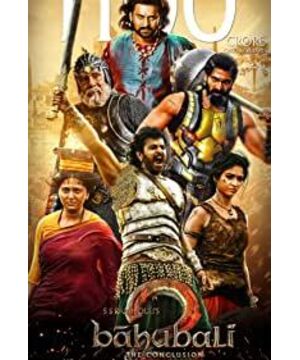When watching this movie, I made a logical mistake from the beginning.
It’s been a long time since I watched the first part. I can’t remember many of the plots. I always thought that the protagonist of the first part had already become a king, so the second part should be that he became a king and fought in the north and south. The story of consolidating power and finding a wife at the same time.
It also makes sense, right?
So watching the "King Baahubali" smooth the surrounding countries all the way, I think it's quite reasonable.
So watching him pretend to be a pig and eat a tiger, pretend to be a fool and capture the heart of a certain country's princess, and embrace the beauty, I think it is quite reasonable.
So watching him abandon the throne because of love and take root in the people, there is a vague meaning of counterattack, I still think it is quite reasonable.
So watching him fight side by side with Katapa, the most reliable subordinate who was once a year-end acquaintance, and was stabbed to death by Katapa. I...
I'm dumbfounded.
what does it mean? Isn't this the protagonist? The protagonist died before the movie ended? ? Are Indian movies so routine now?
Then I realized that this is not the protagonist of the first movie!
This is the protagonist's father...
Just then I remembered, oh yes, the protagonist in the first part has not yet become a king, but he rescued his mother from the villain. A group of civilian soldiers have just been summoned to settle accounts with the villain.
And Katapa, who is dying in his twilight years, is going to tell him stories, telling him how his father, the previous King Baahubali, died, and how he ended up in tribes outside the kingdom. Raised by someone else.
More importantly, "Baahubali" in the first part clearly has a girlfriend.
...How did my brain grow?
So "Baahubali 2" consists of two parts, one part is "origin", which tells the experience of the last Baahubali from invincible to the unfortunate death, and how the later Baahubali was born.
The other part is the "end", about how Baahubali later defeated his uncle who killed his father and became the new king.
In this way, some people may think that it's over. If you haven't watched the first part, would you not understand the second part?
No, if you haven't watched the first part, you can start directly from the second part. There is no problem, because the second part explains the timeline very clearly, and the whole story is very smooth and complete.
On the contrary, if you read the first part and can't remember clearly, you won't understand the second part at first.
For example, my kind of brain damage...
But in the past two years, I have really watched a lot of Indian movies, such as "Little Lori's Monkey God Uncle", "Mysterious Superstar", and "Three Fools Raised Bollywood". The first one that opened this door for me was "Ba The first part of "Khobari".
At that time, I was silly while watching it. I thought the Indians were really interesting. It was so brainstorming that the protagonist would have no problem hitting 10,000 each, so just go to conquer the universe, okay?
By the way, I also feel that Indian movies are really long, and there is actually an intermission setting?
And sing if you don't agree with each other. Fortunately, these songs are pretty good.
After watching these movies all the way, I slowly felt that they were really amazing.
The movies are quite long, but the rhythm is tight, the plot is detailed, and the movie is finished without knowing it. There is no meaning of procrastination at all.
There are a lot of songs, but these songs are closely related to the story. When you sing a song, you can immediately understand the character and plot development of the characters.
More importantly, although these stories have follow-up routines that can be guessed, each story is told very complete.
"Baahubali 2" is a typical example.
There are magical insights. For example, the second generation of King Baahubali wanted to lead his troops to attack the city. Without basic tools to break the city, he used coconut trees to bounce the soldiers against the city wall, and asked them to work in groups of six with long shields. Wrap yourself into a ball, not only to prevent being shot by the arrow from the city head, but also to cushion when it hits the ground.
I must introduce this novel idea well:
Here is another spectacular one:
In addition to brain holes, there are also common routines: heroes with noble backgrounds but grown up among common people, beauties who can fight side by side with heroes, villains who are evil (or their own relatives), loyal veterans, and mothers who endure humiliation; teenagers The monsters were upgraded a little bit to become a unique warrior. In the process of searching for his own life experience, he found the blood and deep hatred on his back. In the process of revenge, he suddenly realized the principles of governing the country and the world, and finally became a king.
Familiar? This is how the Baolian Lantern works.
On the basis of routines, the settings and changes of each role are very reasonable.
The first generation of King Baahubali had an easy-going personality, so he won the hearts of the people, but because he lived a chic life, he didn't need to live with him, as long as he stayed with the one he loved.
His elder brother, King Baladella, was willing to help his younger brother sit on the throne at first, but because he fell in love with the same woman, he hated his younger brother. Coupled with the persuasion of the adulterer around him with ulterior motives, he finally killed him and changed his mind. Became a tyrant.
The veteran Katapa, because his family has sworn to support the royal family for generations, and is loyal, so although he has a deep relationship with King Baahubali, after the throne changed hands, he had to obey the orders of King Baladella. Baahubali later gradually understood what justice is and what a country is. He laid down his loyalty and helped Baahubali's son regain the throne.
Whether it’s the strong and paranoid mother of the first generation of King Baahubali or the wife who has a jealous and hateful personality, the second generation of King Baahubali has risen from confusion and difficulty to the final unveiling, or even every supporting role. Passers-by have their own personalities and their own logic.
All the plot development is closely related to the character's growth, and the brain is very big, but the story is absolutely reasonable.
This is the highest state of storytelling. I am not afraid of routines and whether the audience can guess the follow-up. It is to focus on shaping the characters, let the characters develop the story, and always be wrapped in the story, without unnecessary actions.
After watching the movie, you can remember the characteristics of each character and understand what motivations they made based on their choices. This is enough to be called a good movie.
As for the special effects and scenes, they are the icing on the cake if they are there, and there is nothing and no harm.
What's more, the scene in "Baahubali 2" is large enough, although the special effects are still far from the "top level", it can be seen that they have done their best.
In this way, it is not unreasonable that it can win the highest box office in Indian film history.
After all, there are really not many movies that can tell a story seriously.
Just like my friends discussed with me before, saying that the movie "Number One Player" did not make any overwhelming publicity at the beginning, and the game is not a mainstream culture in China. Why is the box office so good?
Me: Because the story is well told.
A good story, you don’t need to be too familiar with the Chinese culture, you don’t need to understand those background knowledge and easter eggs, you just need to pull you into the plot from the beginning, and then let go of your hands, you won’t be able to get out on your own. .
Many movies (not to mention which ones) are not good at telling stories because they think that the audience is stupid, as long as there are gimmicks, topics, or special effects and scenes.
Then they planted.
To be honest, the audience is not stupid, they can tell the difference between good and bad.
A story with a complete plot and reasonable logic, with some brain holes and some laughter points, who wouldn't want to read it?
View more about Baahubali 2: The Conclusion reviews











